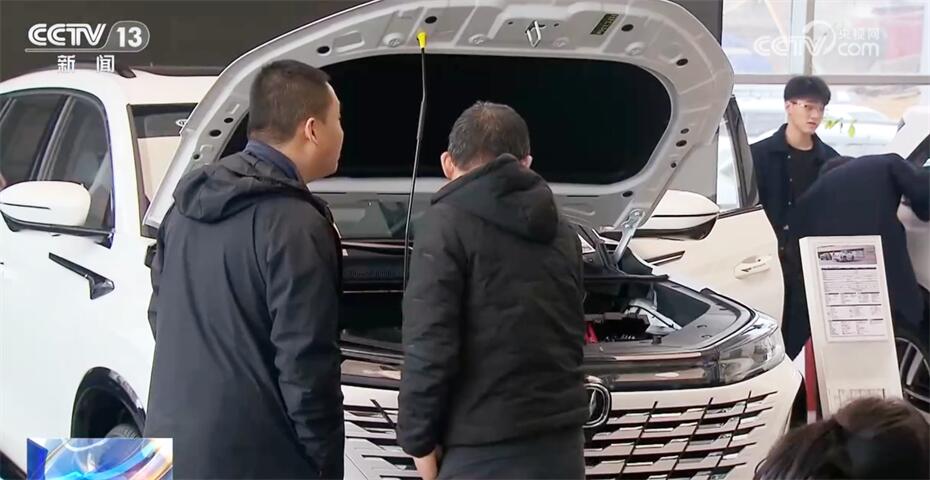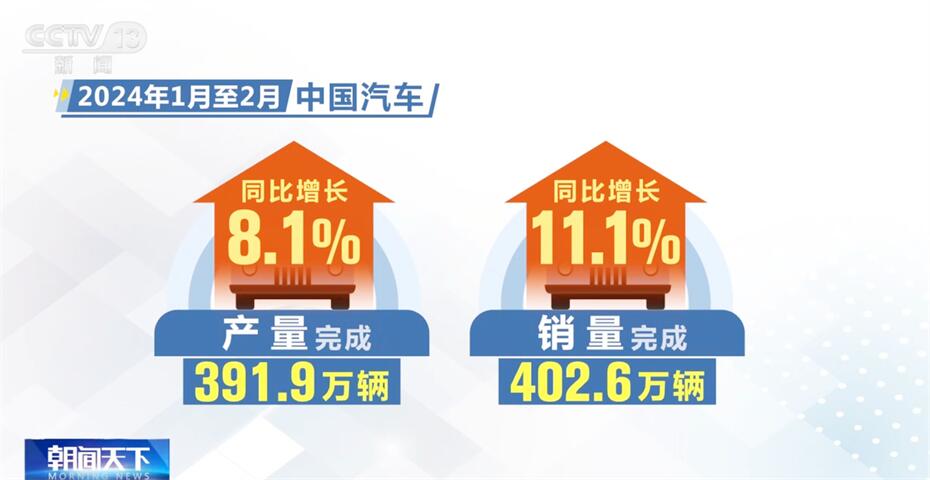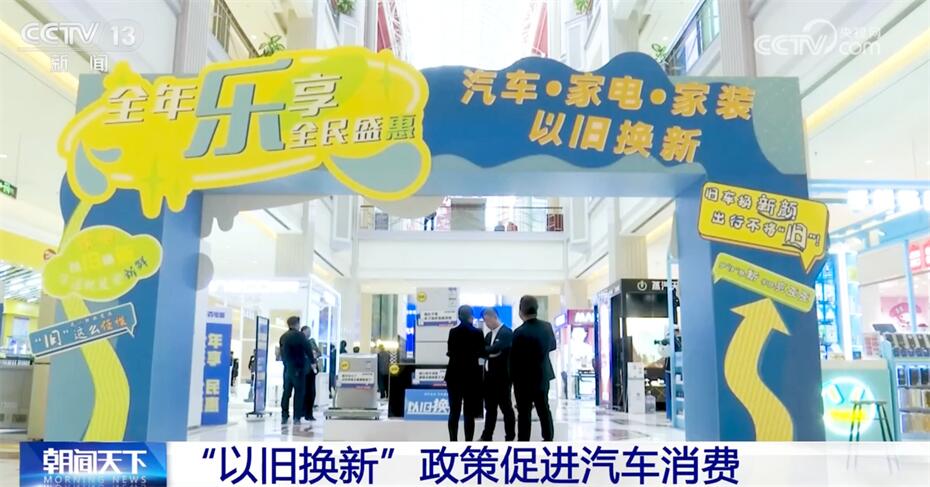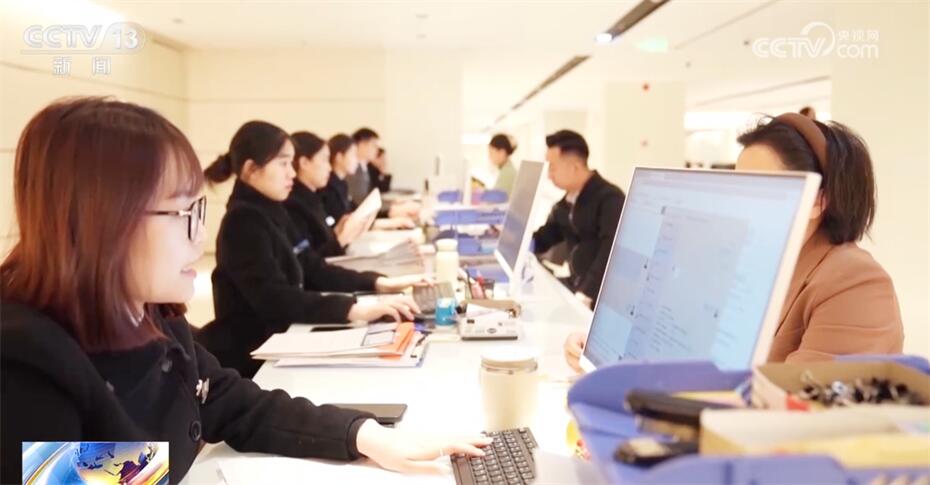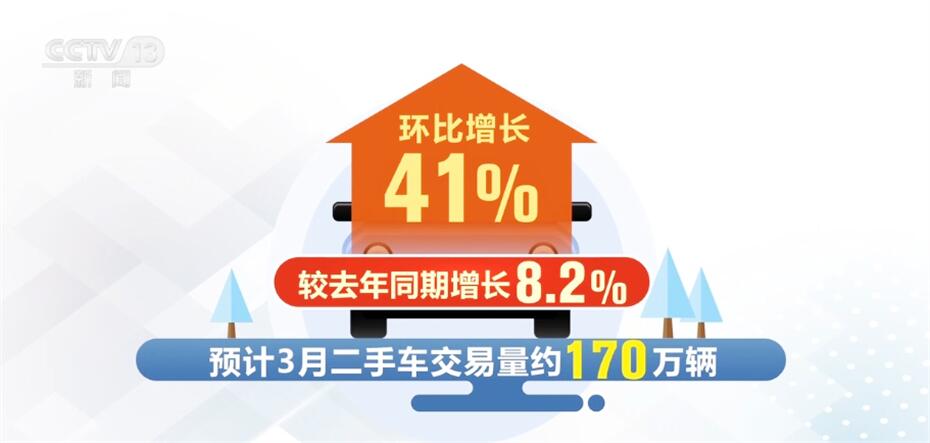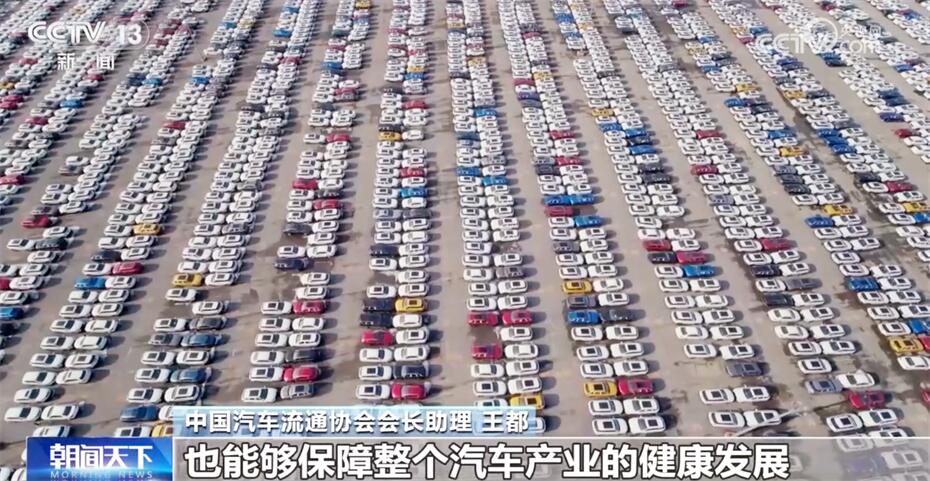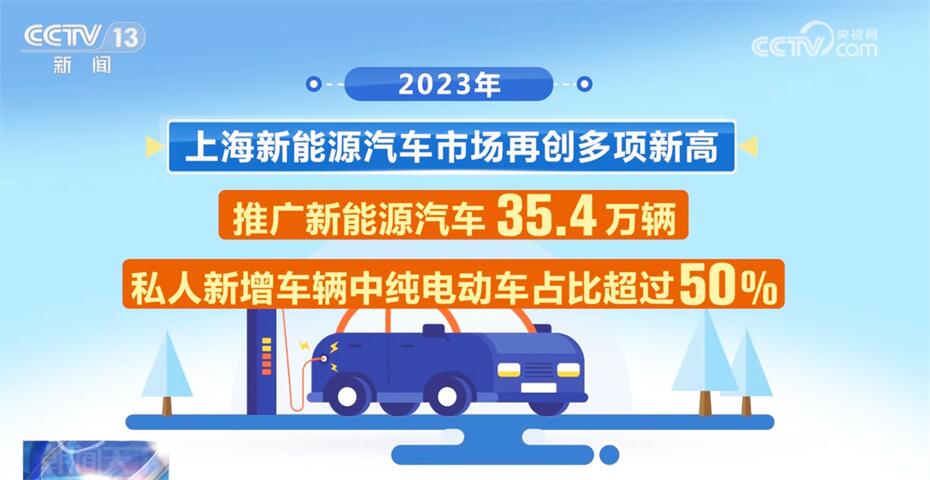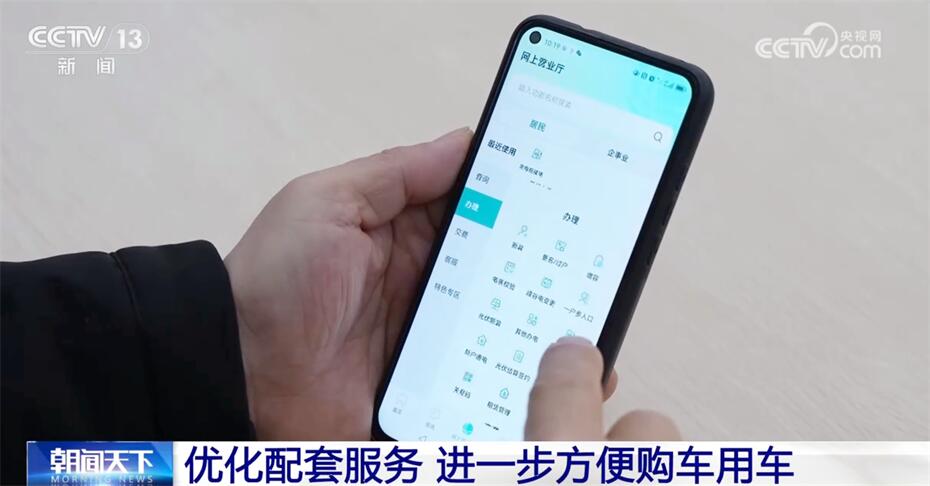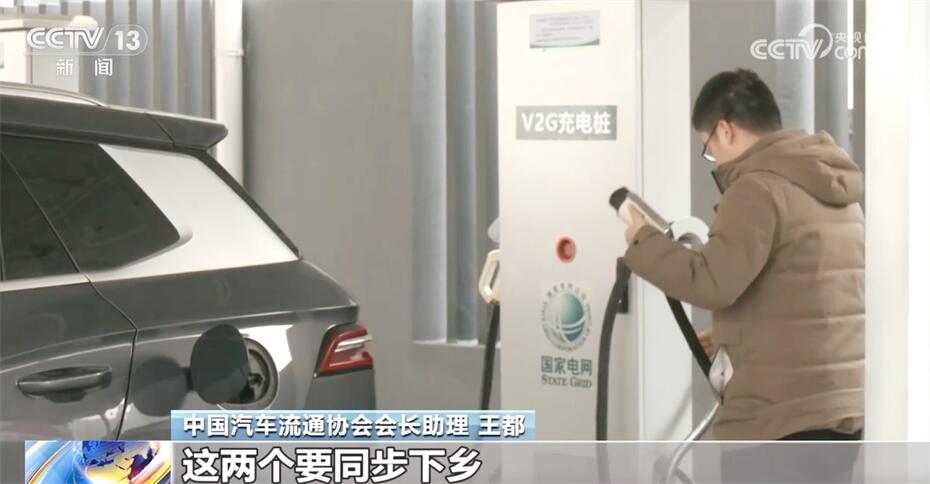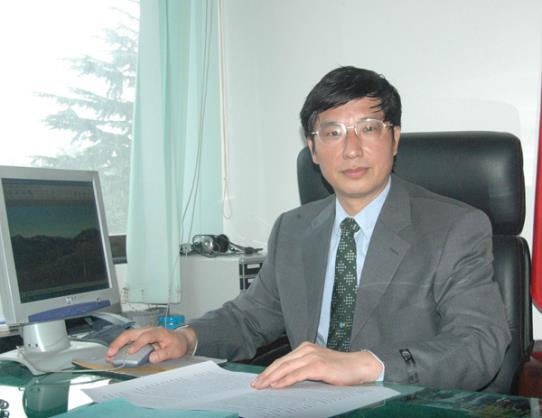National business daily News: Recently, the abnormal event of nucleic acid test results in Lanzhou, Gansu Province has aroused widespread concern. Subsequently, many online articles pointed the finger at Zhang He, the founder of Shenzhen Nuclear Gene Technology Co., Ltd. (hereinafter referred to as Shenzhen Nuclear Gene), the parent company of the involved company, and Zhang Shan, who served as the supervisor of several subsidiaries of Shenzhen Nuclear Gene.
In fact, the abnormal event of Lanzhou nucleic acid test results is not the first time that Shenzhen nuclear gene has problems. In January, 2021, Xingtai City, Hebei Province held a press conference on the prevention and control of COVID-19 epidemic, and reported the false report of nucleic acid test results in Longyao County. The company involved was also indirectly 100% controlled by Shenzhen Nuclear Gene.
What is the situation of Shenzhen nuclear gene in the whirlpool of public opinion? On the afternoon of November 28th, national business daily reporter visited the headquarters office of Shenzhen Nuclear Gene in Nanshan Zhiyuan, Nanshan District, Shenzhen. The field staff refused the reporter’s interview on the grounds that the leader was absent. A property manager of the building told the reporter that the person in charge of the company basically came to the office every morning before leaving the company this morning.
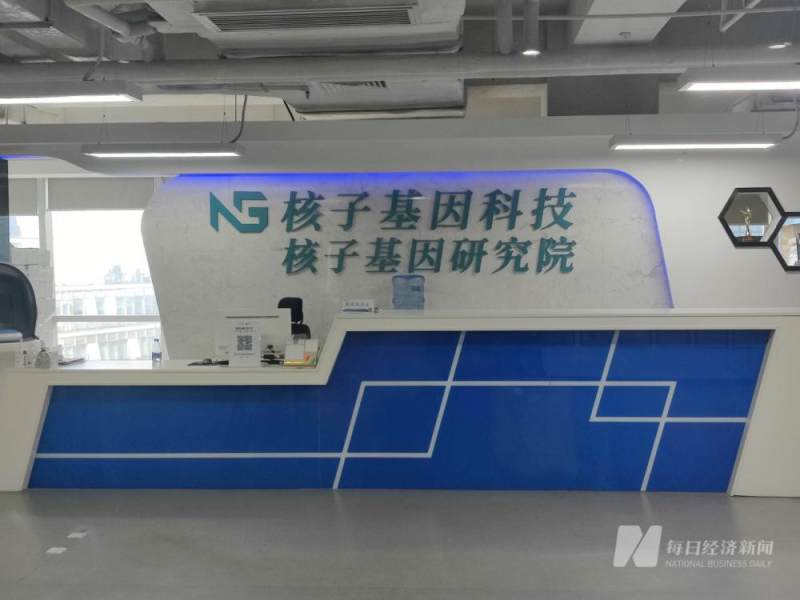
Shenzhen Nuclear Gene Headquarters Image Source: Every reporter Chen Hao photo
Shenzhen Nuclear Gene was established in 2012. According to official website, the company has set up 64 subsidiaries and 50 laboratories nationwide. According to the incomplete statistics of the reporter of national business daily, the company has newly opened more than ten medical laboratory co., Ltd. in various parts of China this year, and these medical laboratory may mainly provide COVID-19 nucleic acid detection services for various places. The reporter noted that the company’s expansion process is inseparable from the form of joining in investment promotion.
Lanzhou Nuclear Huaxi Laboratory was notified.
Recently, an abnormal event occurred in Lanzhou, Gansu Province. On November 25, Lanzhou Health and Health Commission issued a notice saying that on the morning of November 24, 2022, when Qilihe District of Lanzhou organized the transfer of positive infected people according to the results of nucleic acid testing, it was found that the health codes of individual people to be transferred showed negative nucleic acid testing. In view of this situation, the Qilihe District Joint Defense Office immediately reported to the Municipal Joint Defense Office. The Municipal Joint Defense and Joint Control Leading Group attached great importance to it, invited quality control experts from the Provincial Clinical Laboratory Center to participate, and organized a joint investigation team from the urban health and public security departments to check the relevant situation.
According to the above notice, after on-the-spot verification, the basic situation of this incident is: Lanzhou Nuclear Huaxi Laboratory received the nucleic acid test samples, and according to the laboratory testing process, at 18: 00 on November 23, the information of people with abnormal test results was pushed to the Qilihe District Joint Defense Office, and the District Joint Defense Office informed the community at the first time to inform the relevant personnel to wait for transshipment. At 1 o’clock on November 24, the staff of Lanzhou Nuclear Huaxi Laboratory mistakenly entered the list information of individuals with abnormal nucleic acid detection into the negative personnel information package and uploaded it to the work system, so that the health code of individual persons to be transported showed that the nucleic acid detection was negative.
"The occurrence of this incident has interfered with the normal production and life of the masses and the prevention and control of the epidemic, exposing that Lanzhou Nuclear Huaxi Laboratory is not strict with the management of staff and the audit is not in place. We will seriously deal with Lanzhou Nuclear Huaying Laboratory in accordance with relevant laws and regulations. " The notice said.
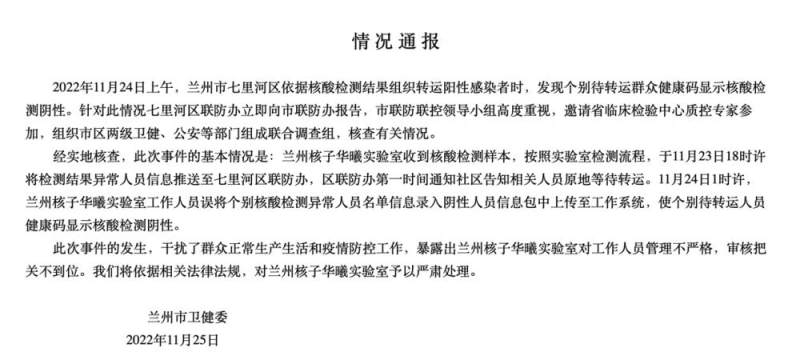
"Briefing" Image source: Lanzhou Health and Health Commission official website
Enterprise investigation shows that Lanzhou Nuclear Huaxi Medical Laboratory Co., Ltd. (hereinafter referred to as Lanzhou Nuclear Huaxi) was established on August 8, 2022 with a registered capital of 10 million yuan, with Cui Lian as the legal representative and Zhang Shan as the supervisor. Lanzhou Nuclear Huaxi is 100% owned by Shenzhen Nuclear Gene. Shenzhen Nuclear Gene official website shows that the company provides professional genetic testing and research services for major scientific research institutions, hospitals and research institutions in China, covering privacy identification, health management, medical examination and scientific research services.
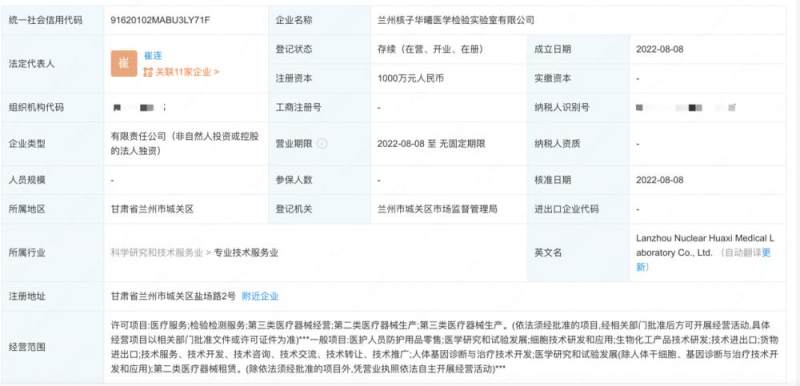
Lanzhou Nuclear Huaying Industrial and Commercial Information Image Source: Enterprise Check Webpage Screenshot
In fact, the abnormal event of Lanzhou nucleic acid test results is not the first time that Shenzhen nuclear gene has problems. On April 14th, 2020, Jinan Huaxi Medical Inspection Co., Ltd. (hereinafter referred to as Jinan Huaxi) was warned and fined by Jinan Municipal Health and Health Commission for failing to put infectious medical wastes in special packaging. In January, 2021, Xingtai City, Hebei Province held a press conference on the prevention and control of COVID-19 epidemic, and reported that the nucleic acid test results in Longyao County were falsely reported. The company involved was Jinan Huaxi. Jinan Huaxi is also indirectly 100% owned by Shenzhen Nuclear Gene.
According to the official report, Longyan County entrusted Jinan Huaxi Medical Laboratory, a subsidiary of Jinan Huaxi, with the second round of all-staff nucleic acid testing. Zhai Moumou, an employee of the company, reported to the health department of Longyao County that all the results were negative when the samples were not tested and the number and results of the tests were unknown, and then reported that there were positive samples. The laboratory was suspended from Covid-19’s nucleic acid detection business, and Zhai was also criminally detained by the police on suspicion of endangering public security by dangerous means.
Recently, many online articles have pointed the finger at the founder of Shenzhen Nuclear Gene, Zhang He, and Zhang Shan, who is a supervisor of several subsidiaries of Shenzhen Nuclear Gene. The company was caught in the whirlpool of public opinion for a time.
The reporter visited Shenzhen Nuclear Gene Headquarters on the spot.
What is the latest situation of Shenzhen nuclear gene in the whirlpool of public opinion? On the afternoon of November 28th, national business daily reporter visited the headquarters office of Shenzhen Nuclear Gene in Nanshan Zhiyuan, Nanshan District, Shenzhen.
In the office where the registered address of the company is located, the front desk wall is engraved with "Shenzhen Nuclear Huaxi Medical Laboratory" (hereinafter referred to as Shenzhen Nuclear Huaxi). Enterprise investigation shows that Shenzhen Nuclear Huaxi was established in July 2015 and is also 100% controlled by Shenzhen Nuclear Gene. The poster on the wall introduces that in February, 2020, Shenzhen Nuclear Huaxi became one of the first batch of third-party COVID-19 nucleic acid testing institutions approved by Shenzhen Health and Health Commission, and the other approved third-party COVID-19 nucleic acid testing institution was Shenzhen Huada Testing Center.
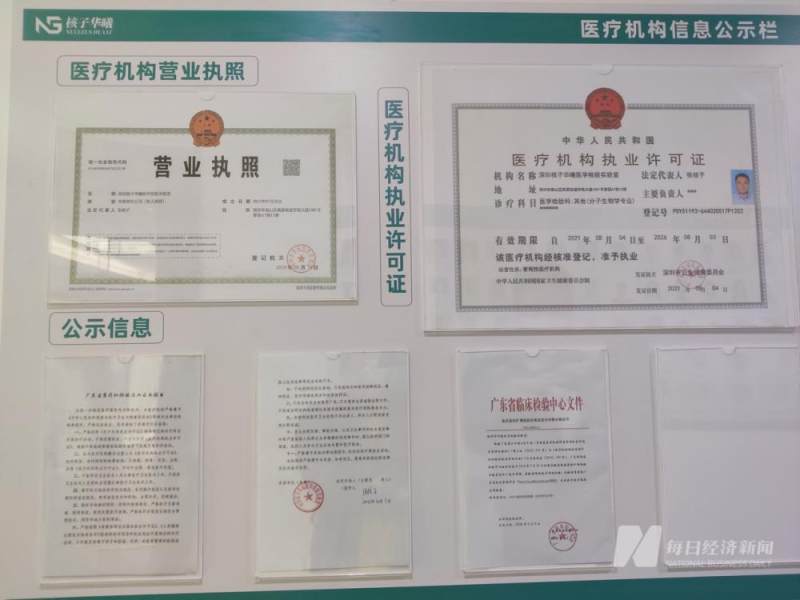
Image source: Every reporter Chen Hao photo
The reporter noticed that the company’s publicity column said that "the number of people tested nationwide has exceeded 700 million, and the sample detection has zero error".
In the office, the company staff are still working normally, and people come in and out from time to time, and some staff members pull boxes of protective articles such as isolation gown to the open space in the office. After the reporter indicated the interview demand, two front desk staff refused the interview on the grounds that "the leader is not in the company today and no one is receiving him". The above-mentioned staff also said, "I don’t know when the leaders will come back. They do have various things outside, including epidemics all over the country, and there are many things to be busy."
A property manager of the office building told reporters that the person in charge of Shenzhen Nuclear Gene usually comes to the office at around 10: 00 every morning. He also met the person in charge of the company this morning, but the person in charge left the office this morning. In another company office in the park, the reporter failed to enter, and the company asked the security guard to take a message and refused to be interviewed.
Who is the founder of the company, Zhang Hezhen? On the CCTV talk show titled "Beyond" in March, 2018, Zhang Hezhen introduced the origin of his own name. His father was a middle school teacher of science and engineering, and named Zhang’s three brothers nuclear, electronic and atomic respectively.
An article on the wechat WeChat official account of "Nuclear Gene Group" described in detail the development track of Zhang He and the company: In 1990, Zhang He was admitted to China Medical University to study DNA identification. After graduation, he came to work in shenzhen public by introducing high-tech talents and organized the earliest DNA identification center in China. Later, Zhang Hezhen left the Public Security Bureau to start his own business. In 2000, he established Shenzhen Hongshi Villa Decoration Company (now known as Shenzhen Hongshi Decoration Engineering Co., Ltd.), and then withdrew from the list of shareholders in 2018. Zhang Hezhen also entered the field of real estate consulting and brokerage, and jointly founded Shenzhen Hongshi Real Estate Consulting Co., Ltd. with Ba Ying, but the company has been cancelled.
In 2012, Zhang He founded Shenzhen Nuclear Gene. Enterprise investigation shows that the top two shareholders of the company, Zhang He and Ba Ying, hold 64.7351% and 12.1378% respectively. The registered capital of the company is 37.07 million yuan, 62 companies have been invested abroad, and 55 companies are in existence and in business. In 2013, Shenzhen Nuclear Gene established Guangdong Huaxi Forensic Material Evidence Judicial Appraisal Institute in Shenzhen and established a research institute in Shenyang. Zhang Hezhen has 30 affiliated enterprises and served as the legal representative of 22 of them.
Recruiting nucleic acid samplers in Hohhot can cost more than 10,000 yuan a month.
According to many media reports, after 2013, Shenzhen Nuclear Gene expanded at the rate of setting up three or four inspection laboratories and forensic laboratories every year.
In an article published by WeChat official account, the wechat of Nuclear Gene Group, I wrote: "In order to make genetic technology enter the life of every ordinary person from the unreachable peak of science and technology, people can enjoy efficient, accurate and scientific genetic testing services near their homes, and finally realize that genetic testing is as popular and convenient as physical examination. In 2016, Nuclear Gene launched the’ Hundred Brands and Ten Stores’ program in the genetic industry."
According to the introduction of Shenzhen Nuclear Gene, the so-called "100-brand" means that 100 laboratories have been laid out nationwide and obtained national licenses; "Wandian" means that there are 10,000 "nuclear gene health centers" in China.
In official website of Shenzhen Nuclear Gene, the words "Gene has come, and Nuclear invites you to join the gene industry" are very striking. Click on the column of "Investment Center" of WeChat official account, a nuclear gene group, and it says "Join the genetic testing, unlimited money". The key words below are also very straightforward: "No joining fee, zero foundation and key state support".
In the program "Beyond", Zhang Hezhen talked about the concept of "gene hut", which was used to popularize genetic knowledge and provide services, and said that more than 500 houses had been opened at that time, with the goal of opening 10,000 houses. In the investment promotion page, joining a gene hut only needs a 10㎡ storefront and 1-2 operators. After being trained by nuclear genes, they can engage in health management consultation, DNA paternity and genetic testing sampling and consultation.
Shenzhen Nuclear Gene held a large number of promotion activities in the rapid development stage of agents. Official website, the company, shows that it regularly holds a promotion meeting every month in 17 major first-and second-tier cities, with Zhang Hezhen giving a lecture on profit model, marketing channels and case analysis. However, the above-mentioned joining information was mainly released before 2019, which was not related to COVID-19 testing business.
Shenzhen Nuclear Gene claims that the company has obtained 29 medical and judicial licenses approved by the state, and has more than 300 cutting-edge technology and management staff including nearly 200 doctors, masters and returned students. It has 29 independent laboratory platforms, including 19 forensic laboratories and 10 medical laboratory.
According to the reporter’s incomplete statistics, since 2022, Shenzhen Nuclear Gene has opened more than ten subsidiaries named after "Medical Laboratory Co., Ltd.", including Quanzhou Nuclear Huaxi Medical Laboratory Co., Ltd., Beijing Nuclear Huaxi Future Medical Laboratory Co., Ltd., Xiamen Nuclear Huaxi Medical Laboratory Co., Ltd., Yinchuan Nuclear Huaxi Medical Laboratory Co., Ltd. and so on. These medical laboratories may mainly provide COVID-19 nucleic acid detection services for various places.
On a recruitment APP, the reporter searched for the keyword "Nuclear Huaying", showing that there are 10 recruitment entities, and the publisher is "Shenzhen Nuclear Gene Technology Co., Ltd." and its subsidiaries, with a total number of positions exceeding 300. Among them, Shenzhen Nuclear Huaxi Medical Laboratory Co., Ltd. has released more than 200 posts, involving first-line posts such as nucleic acid sampler, laboratory inspector and freight driver, as well as system posts such as quality inspection, data and salary, and even Tik Tok anchor, whose working locations involve more than ten first-and second-tier cities such as Shenzhen, Shanghai, Shenyang and Nanchang.
A recruitment information in Hohhot shows that the monthly salary of the sampler ranges from 8,000 yuan to 13,000 yuan, and he is responsible for specific work such as nasopharyngeal swab collection and venous blood drawing. He is required to have a college degree or above and hold a nurse qualification certificate.
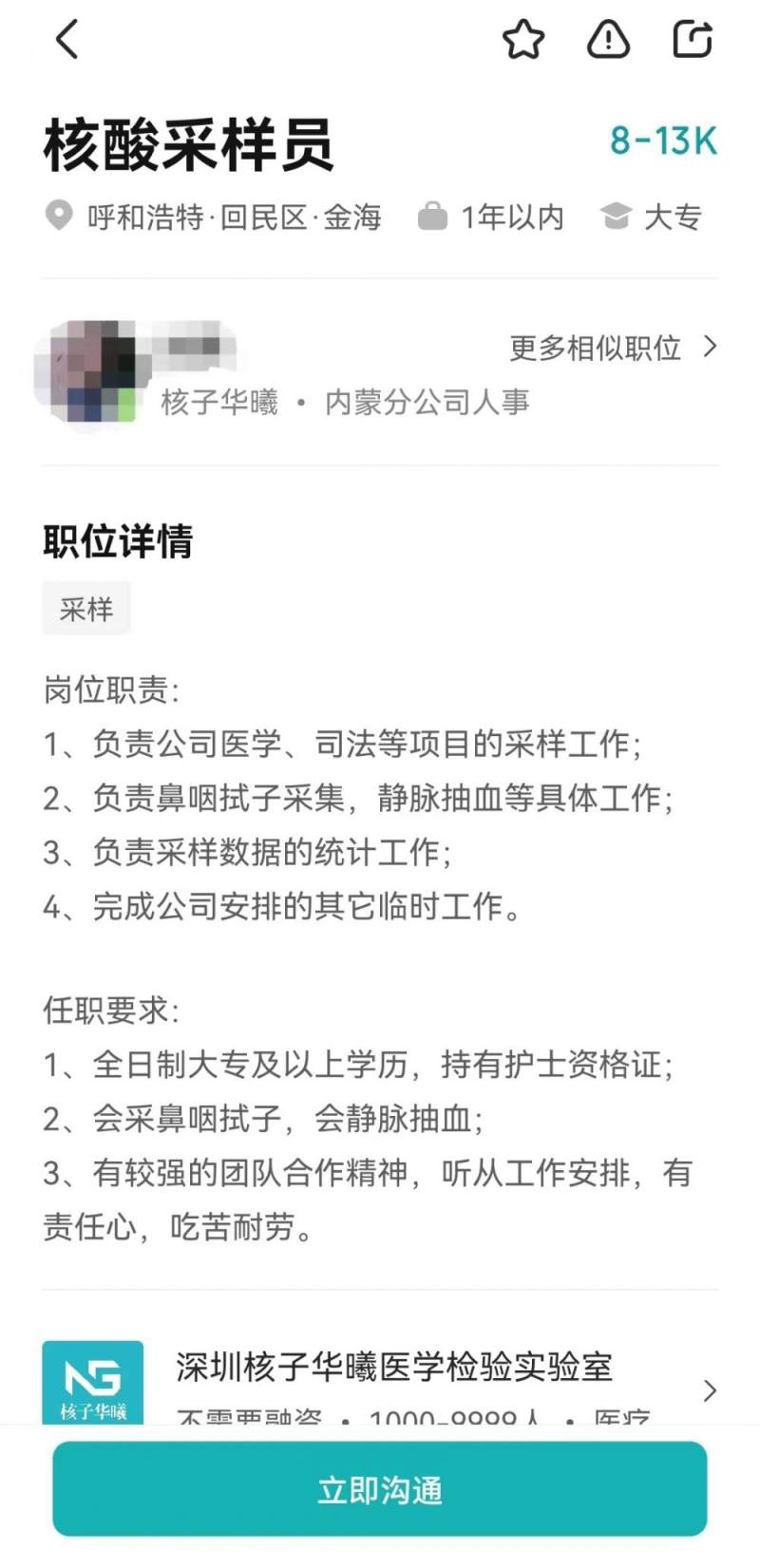
Image source: screenshot of recruitment APP
In another labor dispatch recruitment released by Beijing Century Yingcai Human Resources Consulting Co., Ltd., the words "800 nurses of nucleic acid sampling doctors will be married in 600 days" and "eat and control, and pay three days later" were written, but other than that, no qualifications and requirements were stated. The work place was located in Daxing District, Beijing, and the client company was Beijing Nuclear Huaxi Medical Inspection Laboratory Co., Ltd.
Original title: Shenzhen nuclear gene with repeated problems in nucleic acid detection: Sampling staff are recruited in many places across the country, and the monthly salary in third-tier cities can exceed 10,000.
Editor: Huang Ling
Editor: Gong Xiaoran
Audit: Feng Fei





















